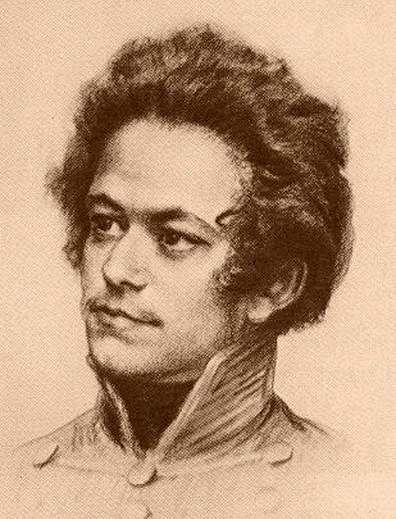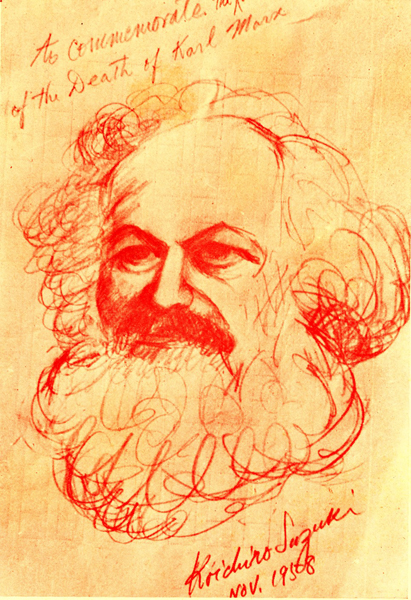Year 1818
Karl Heinrich Marx was born into a comfortable middle class home in Trier on the river Moselle in Germany on May 5, 1818. He came from a long line of rabbis on both sides of his family and his father, a man who knew Voltaire and Lessing by heart, had agreed to baptism as a Protestant so that he would not lose his job as one of the most respected lawyers in Trier. At the age of seventeen, Marx enrolled in the Faculty of Law at the University of Bonn. At Bonn he became engaged to Jenny von Westphalen, the daughter of Baron von Westphalen , a prominent member of Trier society, and man responsible for interesting Marx in Romantic literature and Saint-Simonian politics. The following year Marx's father sent him to the more serious University of Berlin where he remained four years, at which time he abandoned his romanticism for the Hegelianism which ruled in Berlin at the time.
Philosophy
Arriving in Paris at the end of 1843, Marx rapidly made contact with organized groups of émigré German workers and with various sects of French socialists. He also edited the short-lived Deutsch-Französische Jahrbücher which was intended to bridge French socialism and the German radical Hegelians. During his first few months in Paris, Marx became a communist and set down his views in a series of writings known as the Economic and Philosophical Manuscripts (1844), which remained unpublished until the 1930s. In the Manuscripts, Marx outlined a humanist conception of communism, influenced by the philosophy of Ludwig Feuerbach and based on a contrast between the alienated nature of labor under capitalism and a communist society in which human beings freely developed their nature in cooperative production. It was also in Paris that Marx developed his lifelong partnership with Friedrich Engels (1820–1895).
"Sell a man a fish, he eats for a day,
teach a man how to fish, you ruin a
wonderful business opportunity."
– K. Marx

The Communist Manifesto
Marx was expelled from Paris at the end of 1844 and with Engels, moved to Brussels where he remained for the next three years, visiting England where Engels' family had cotton spinning interests in Manchester. While in Brussels Marx devoted himself to an intensive study of history and elaborated what came to be known as the materialist conception of history. This he developed in a manuscript (published posthumously as The German Ideology), of which the basic thesis was that "the nature of individuals depends on the material conditions determining their production." Marx traced the history of the various modes of production and predicted the collapse of the present one — industrial capitalism — and its replacement by communism.
At the same time Marx was composing The German Ideology, he also wrote a polemic ("The Poverty of Philosophy") against the idealistic socialism of P. J. Proudhon (1809–1865). He also joined the Communist League. This was an organization of German émigré workers with its center in London of which Marx and Engels became the major theoreticians. At a conference of the League in London at the end of 1847 Marx and Engels were commissioned to write a succinct declaration of their position. Scarcely was The Communist Manifesto published than the 1848 wave of revolutions broke out in Europe.
"Capital is dead labor, which, vampire-like,
lives only by sucking living labor, and
lives the more, the more labor it sucks."
– K. Marx
Social Impact
The philosopher, social scientist, historian and revolutionary, Karl Marx, is without a doubt the most influential socialist thinker to emerge in the 19th century. Although he was largely ignored by scholars in his own lifetime, his social, economic and political ideas gained rapid acceptance in the socialist movement after his death in 1883. Until quite recently almost half the population of the world lived under regimes that claim to be Marxist. This very success, however, has meant that the original ideas of Marx have often been modified and his meanings adapted to a great variety of political circumstances. In addition, the fact that Marx delayed publication of many of his writings meant that is been only recently that scholars had the opportunity to appreciate Marx's intellectual stature.
"Go on, get out. Last words are for
fools who haven't said enough."
– K. Marx

by Vassili Orlov, Junior
Graphic Designer at the
University of The Arts under
instruction of Rachele Riley.
Spring 2011.


